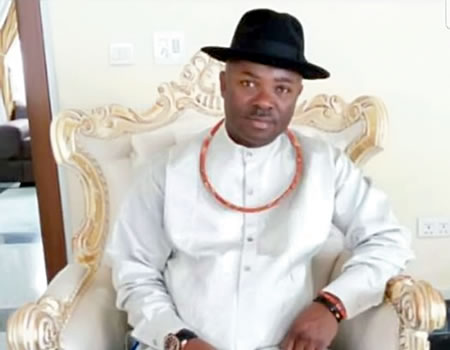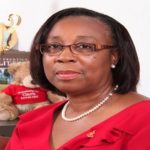In this interview by Jacob Segun Olatunji, a member in the House of Representatives, Honourable Ben Rollands Igbakpa, dissects various national issues ranging from the workings of the National Assembly to the insecurity in the country, declaring that bombing is not the solution to the Boko Haram insurgency.
What’s your take on the Federal Government’s intention to withdraw the military from the conflict-torn North-East so that the police can perform the civil duty?
We know the role of soldiers is to protect our territory against external aggression. They are not for internal crisis. That is the role of the mobile policemen; they are trained to move in swiftly and quell any internal uprising internally But, we have seen our soldiers, even on the streets now mounting road blocks. You see the governor of Borno State, Professor Babagana Umara Zulum screaming and crying that soldiers were allegedly indulging extortion of travellers because they have been brought into this kind of civil duty. They have found themselves in a civilian environment you know when a goat and a dog stay too long in a place, they will start acting as one. So, I think the plan withdrawal of soldiers from civil duty is a good approach to restoring sanity. We know the Boko Haram thing is beyond the police; there is nothing wrong to bring soldiers to serve as a stop gap. Since they have done their work, they should leave and allow the police continue from where they stopped.
So, how will you assess the security situation in the country now?
Well, I am not an expert but I know that it is not what it should be. However, the problem is not limited to Nigeria; it is everywhere. Go to Sudan, Cameroun, Ethiopia, Iraq even in the United Kingdom and the United States of America (USA), there is the problem of guerrilla fighters. I do not think Nigeria is an exception. The militia activities is really affecting the entire worldin the case of Nigeria, there is the need for us to focus more on intelligence gathering because the kind of ongoing war is not the conventional one. You are fighting people you don’t even know where they are coming from; they strike from nowhere; you can’t say ‘this is their territory; let us cordon them off.’ They are among us; the Boko Haram member stay with us, so we should device the intelligence gathering mechanism to fish them out. They have sympathisers among us. From the way things are, it is not just about bombing them alone that we can end insurgency. The government can explore the option of dialogue if it can locate the leaders of the insurgents. On the farmers-herders’ issue, I like what the Miyatti Allah Cattle Herders’ Association did recently when they told their people to stop grazing at night. This is because most times, you see you leave your farm by 5:00 p.m. you come back the next day and the entire farm has been ravaged. So, it means the leaders of the herders understand that Nigeria belongs to everybody and the more peaceful the country is the better for all of us.
As a member representing the Niger Delta region, how best do you think the crisis rocking the Niger Delta Development Commission (NDDC), which was meant to accelerate the pace of development in the area but had not be able to make much difference and impact?
For me, I think it has been able to resolve some of the challenges to a great extent. The first thing is to understand that certain things were not right, and which have been identified so far that the funds were released to the NDDC. I think that is why Mr. President has ordered for a forensic audit which we are all going to back him fully. We have actually said we should be involved as the true representatives of the people. So, we are appealing to Mr. President to get the legislative arm involved in the forensic audit if for nothing at least to identify projects effectively and avoid confusion, A project that falls in the category of state can be given to you as a project that is for the NDDC ostensibly to cover up. We want to be involved so that we can actually guide them on what they are going to do. I know of projects that have been in my area since 2011 and 2012 and there is nothing to show for them. We want to help Mr President to ensure the takeoff of a new regime in the NDDC meant to actually develop the area. Mr. President has said the interim management committee should oversee the forensic audit before he can reconstitute the board. So, we in the Niger Delta quite agree with him.
So, it is a good that the President has said the forensic audit should be done and I think people should be sanctioned; people should be punished. Anybody that has collected money and has not done the work or the work is shabbily done, should be sanctioned because we all know that at the state level, if you do a road, there is a five percent retention that is kept. After a year, you get the five percent retention after which the road becomes a government problem to maintain the road afterwards. But any road that is done and it’s less than a year, the person should come back and fix it. So, it’s not just doing the forensic audit to say see these are the faults, but the persons responsible for the fault should actually be punished. Companies should be sanctioned because it is unfair for somebody to just collect money without doing the job and most of these people are from the Niger Delta. It is sad that most of them are from the Niger Delta region? So I think the issue is going to be resolved.
Having spent quite a number of months in the National Assembly, how will you review your activities and the performance of the ninth National Assembly so far?
Fortunately, this is my first time in the National Assembly and before I came, I had known Mr Speaker, Honouraable Femi Gbajabiamila from afar. I had always watched and admired his contributions to the House as the Minority Leader to the Majority leader, so I was quick to take sides with him in his quest to become the speaker of the ninth House. I don’t need anybody to tell me because I have seen him and he is somebody I have admired so I came out, spoke to my colleagues that are actually from my region and we all agreed on the need to support him, especially those of us that were just coming in. He is one man I know that has always done well because I believe in people that are highly independent.
On the ninth Assembly, we have been responsible for a lot of positive changes. Mr Speaker, in his inaugural speech, did tell us that things were going to change. He said some might have to shake up the table and really you can see that they have been drastic bills being sponsored by him. Look at the one that he said 40 percent of the annual budget should go to capital projects. He is not somebody who says this is PDP, this is APC and because the APC is at the helm of affairs, I should not do anything. He does what is right. So, he has been a good pilot in the ninth Assembly, especially in the House. The House leadership came up with an agenda and that is what we are implementing and for the first time, you can see the quality of the bills and motions coming up. The issue of returning the budget cycle from January to December is phenomenal. I think the ninth National Assembly has done very well. Recall that for the first six months, people were still involved in litigation on issues arising from the 2019 elections, so there was no time to really settle down. I was one of them; I had to devote so much time to the matter at the election tribunal to the appeal Court. I believe that in 2020, we are definitely going to do more.
WATCH TOP VIDEOS FROM NIGERIAN TRIBUNE TV
- Let’s Talk About SELF-AWARENESS
- Is Your Confidence Mistaken for Pride? Let’s talk about it
- Is Etiquette About Perfection…Or Just Not Being Rude?
- Top Psychologist Reveal 3 Signs You’re Struggling With Imposter Syndrome
- Do You Pick Up Work-Related Calls at Midnight or Never? Let’s Talk About Boundaries






